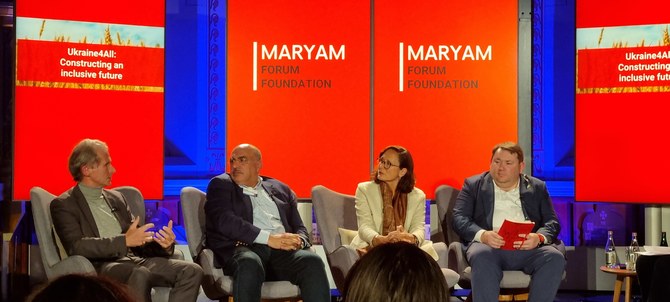DAVOS: Public- as well as private-sector funding is vital for the reconstruction of Ukraine in a post-war scenario, but ensuring corruption does not stall rebuilding efforts is also essential, a Maryam Forum Foundation panel said at the World Economic Forum (WEF).
The Ukraine4All: Constructing an Inclusive Future event invited business and political figures, as well as young Ukrainian global leaders, to discuss the future of Ukraine after the end of hostilities in its war with Russia.
Panelist and Maryam co-founder Khaled Janahi said that failures in previous Western reconstruction efforts in countries such as Iraq cannot be repeated.
“The issue is, (Ukraine needs) 1 trillion dollars and it’s how to make sure that out of that trillion dollars, $980 billion is really used properly, spent by the Ukrainians, with the help of outside, to build up Ukraine, whether it is hard infrastructure or soft infrastructure and to have the institutions around it,” he said.
“And only 20 billion of it going to corruption, instead of 400 billion going to corruption and 600 (to rebuilding).”
He said that the mistakes of the US reconstruction project in Iraq, which he said was still “effectively a failed state,” were a good lesson to learn from.
“The Americans invaded, they left, and in the Arab world we have the story ‘Ali Baba and the Forty Thieves’ — they left forty thieves in the country,” Janahi said.
“In that country, they are still paying the price for these forty thieves.
“It is not only Ukrainians that have to fight their own corruption from the inside, we also have to make sure about the outside,” he added.
Janahi said that compared to refugees from the MENA region, those fleeing Ukraine would have better opportunities.
“We have all these refugees — Syrian, Palestinians, Yemenis — and the good news is that Ukrainians won’t be the same,” he said.
“Ukranians will be looked after and they will come out of this because the world is going that way, and that’s the way the world is.
“And one reason is we, as the Arabs, are not pushing for those guys from our part of the world to be looked after.
“We live in a world today that is run by rulers, not by leaders. Even if they are elected, a lot of them are rulers not leaders. Unfortunately what’s happened, whether it’s Syria or now in Ukraine, it proves the point,” he added.
His fellow panellist, businessman Martin Sorrell, said it will require a collaborative effort from both the private and public sectors if the Ukrainian reconstruction project is to prove successful.
“The fundamental issue is that Putin will remain in power, and Putin will continue to pursue (this war). The only way you are going to be able to reconstruct Ukraine is by not relying on the private sector on its own —there must be an effort from government institutions,” he added.
“I don’t think the private sector on its own will do the business. It will take concerted, coordinated public sector and government intervention on a significant scale.”
Eric Cantor, former US congressman and house majority leader, agreed, and also warned of the potential for corrupt officials to derail the rebuilding project.
“The private sector won’t be first — government has to be the catalyst,” he said. “But I also think there has to be transparency. You’ve got to see where the corruption is.
“How do we keep the taxpayer dollars out of the hands of the oligarchs? How do you make sure the procurement process in the cities and towns of Ukraine, that you don’t see government officials taking some of that money?
“That image has to now grow into how the world can believe that Ukraine can build a new Ukraine, and not the way it was,” he added.

